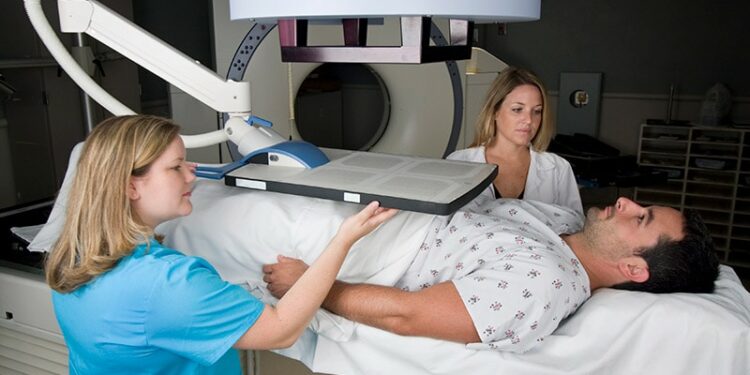[ad_1]
TOPLINE:
In patients with locally advanced rectal cancer who receive neoadjuvant therapy, radiation dose intensification improves pathologic complete response but leads to a small increase in acute toxicities.
METHODOLOGY:
- Preoperative radiochemotherapy is standard of care for treating locally advanced rectal cancer, but 20%-30% of the patients develop metastatic disease. Although radiation dose escalation has been shown to improve local control and tumor regression, studies supporting this approach are limited.
- Researchers analyzed outcomes from 1028 patients with locally advanced rectal cancer (cT2-cT4 or cN0-cN2; median age, 65 years) who were treated with preoperative radiochemotherapy across 12 centers.
- Overall, 664 participants received a standard radiation dose (range, 44.25-50.00 Gy; median, 49.56 Gy) and 364 received an intensified radiation dose (range 55.92-60.00 Gy; median, 55.92 Gy). Patient outcomes were compared at four time points: Up to 7 weeks, 8-10 weeks, 11-12 weeks, and 13-plus weeks.
- The primary endpoint was pathologic complete response. Secondary outcomes included downstage rate, time to surgery, and adverse events.
TAKEAWAY:
- The pathologic complete response rate was 21.5% in the overall population; the rate was significantly higher among patients who received the intensified radiation dose than those who received the standard dose (26.6% vs 17.0%).
- The pathologic complete response rate more than doubled between the earliest time point (≤ 7 weeks) and the second time point (8-10 weeks) in both the groups. At the last time point (≥ 13 weeks), the pathologic complete response rate was higher among patients who received a radiation boost (39.3% vs 20.4%).
- Patients with cT3 and cT4 tumors who received the radiation boost had significantly higher pathologic complete response rates (25.7% vs 17.3% for cT3 and 29.7% vs 5.4% for cT4), while those with cT2 tumors did not. Also, 63.5% of patients who received a radiation boost were downstaged compared with 51.0% with no boost.
- However, patients who received the intensified dose had higher grade ≥ 3 gastrointestinal (6.0% vs 1.7%), hematologic (0.5% vs 0.4%), and skin (2.2% vs 0.5%) toxicities.
IN PRACTICE:
“The present large multicenter study demonstrated the possible role of intensified [radiotherapy] in improving the local pathological response in rectal cancer treated with neoadjuvant intent,” the authors wrote. However, radiotherapy “intensification could lead to slightly higher treatment-related toxicity, but only in a minority of patients.”
SOURCE:
This study, led by Luca Nicosia, Advanced Radiation Oncology Department, IRCCS Sacro Cuore Don Calabria Hospital, Cancer Care Center, Verona, Italy, was published online in Radiotherapy and Oncology.
LIMITATIONS:
The retrospective nature of the analysis may have introduced bias, though this would be partially mitigated by the large patient population. The multicenter approach may reflect differences in clinical practice despite consistent clinical data across centers. Additionally, the lack of data on surgical and late radiation toxicities prevented the assessment of long-term safety outcomes.
DISCLOSURES:
The authors did not disclose any funding information. The authors reported no known competing financial interests or personal relationships that could have influenced the work presented in this article.
This article was created using several editorial tools, including AI, as part of the process. Human editors reviewed this content before publication.
[ad_2]
Source link : https://www.medscape.com/viewarticle/radiation-intensification-enhances-response-rectal-cancer-2025a10003ef?src=rss
Author :
Publish date : 2025-02-11 04:21:50
Copyright for syndicated content belongs to the linked Source.














